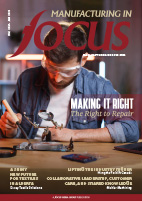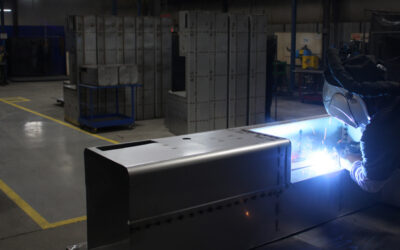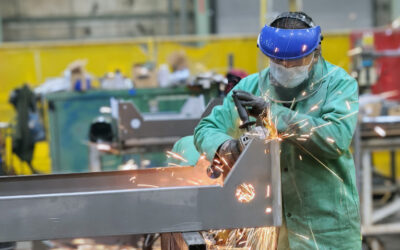Every successful business start needs a spark. When we asked Mark Zimny, P.Eng., founder of Promation, what led him to the world of automation and robotic systems, he replied “a love for machinery and automation.” It’s there for all to see.
Working as a product development manager for industrial manufacturing giant Siemens in the 1990s, Zimny recognized the huge market pull for automation in Ontario – automotive in particular. Galvanized by this he founded Promation in the basement of his home in 1995.
Today, he leads the successful company as Chief Executive Officer, along with Darryl Spector as President. Building on Promation’s established foundations in three divisions: Nuclear, Automotive, and Industrial, they are actively and aggressively growing to develop a strong presence in the defined verticals of aerospace, automation, pharmaceuticals, life sciences, and defence.
A quarter century
With a dedicated staff of 125 employees in the fields of electrical, mechanical and controls design, manufacturing, machining, fabrication, competency management, assembly, integration, testing, research and development, project management, and quality assurance, Promation delivers best-in-class automation solutions to clients globally.
As it celebrates its 25th anniversary, the company acknowledges that much of its strength comes from the colossal bank of employee skills and dedication that has been built up over the years. The entire company will soon share in an internal celebration.
“We are looking at some fundamental benefit initiatives,” says Darryl Spector, President of Promation. “They have played an essential role in our success and prosperity.”
Experiencing market shifts over the past quarter century, the story of Promation is one of resilience, adaptability, and well-honed survival instincts helping the business navigate downturns, especially those being felt worldwide because of Coronavirus.
“When the COVID-19 pandemic happened, sure there was anxiety,” says Spector, “but there was also a high degree of confidence in our intrinsic ability to navigate this dynamic and unknown situation.”
Although things have changed considerably in 2020 as the world wrestles with COVID-19, Promation’s core competencies and values remain consistent. From valuing all clients to supporting staff and inclusivity, to being transparent, accountable, and socially responsible, Promation continues to be driven by experience, technology, and integrity.
Calibrating the culture…
When Mark Zimny founded Promation, one of his goals was to build the business around its people.
A great believer in investing in talent and potential, the company continues to welcome ambitious women and men, and calibrates its direction in harmony with the individual talents and potentials of the people on staff to move the business forward – a value that is embraced throughout all levels of the management team.
“So it is mutual development and growth,” Spector says. “As we invest in people and create opportunities and engage them, they also allow us to grow the business into new areas and new markets.”
Promation Nuclear was named one of Canada’s Top Small & Medium Employers (SMEs) this year for reasons that include its investment in employee development – including tuition subsidies and financial incentives for successful completion of certain credentials– together with charitable initiatives directed to “youth engagement, Indigenous communities, and women at risk,” and subsidizing gym memberships for employees.
For 2021, the company plans to apply these measures to Promation as a whole. Going further – and in celebration of Promation’s 25 years in business – other substantial investments are being launched this month such as instituting a deferred profit sharing plan (DPSP), and establishing Promation’s founding anniversary date as an official internal company-wide paid day off.
Receiving other awards over the years for human resources, Promation’s focus on recruitment is expansive. Over the past decade, the company has forged a relationship with the Newcomer Centre of Peel (NCP), a charitable non-profit multi-service agency that provides newcomers with settlement assistance including employment services such as creating a resume and coaching interview strategies, English-language training, and more.
As a company priding itself on employing talented Canadians and recently landed immigrants, Promation receives profiles of newly-arrived professional candidates for possible job placing.
“As an employer, we treat these people with genuine respect out of the gates,” says Spector of newcomers to Canada. “Perhaps a quarter of our staffing at one point came from this program, because we’ve found that the work ethic of these candidates is tremendous. They’ve already crossed the Rubicon; they’ve already committed to making things work here in Canada, so their motive to succeed can sometimes be stronger than somebody off the street.”
… And celebrating the culture
Fostering a welcoming, family-like workplace environment, Promation hopes to go back to the times before COVID, where the company organized international potlucks. Bringing in a dish from their place of origin not only gave staff a sense of pride, but also provided other employees with an opportunity to understand and appreciate one another.
“It’s not just cultural. We also strive to promote ethnic and gender diversity,” comments Spector. “It goes towards our overall values of being socially responsible and ethical for the right reasons, not just to check the box.”
A member of the Canadian Council for Aboriginal Business (CCAB) and the Progressive Aboriginal Relations (PAR) program, Promation held an awareness training session with Robert (Bob) Watts, one of the founders of the Truth and Reconciliation Commission of Canada (TRC), and a former Chief of Staff to the Assembly of First Nations’ Phil Fontaine, as part of the journey to establish cultural awareness and appreciation within the organization.
Watts spoke to staff about the history of Indigenous people in Canada, and those attending were interested and frequently surprised. “It is multifaceted,” says Spector. “We use these kinds of initiatives because it is the right thing to do, but then we also use them as a mechanism to engage our staff in a way beyond the usual company event.”
Back to university
Along with welcoming newcomers to Canada to its ranks, Promation is involved with the University of Waterloo, which saw 10 researchers receive over $15.6 million from the Natural Sciences and Engineering Research Council of Canada (NSERC) “to fund two networks and eight projects that will further research efforts through academic and industry collaborations,” according to the University.
The announcement of the Strategic Partnerships Grants was made at Promation’s Oakville headquarters in August 2018. As an industry partner, the company is working with the institution on furthering additive manufacturing, with Promation being the largest investor.
With PhD graduates from the University having been hired to oversee a specific research and development program, research is one of the disciplines being harnessed to develop and innovate in the field of relevant technologies, advances which the company will be hoping to bring to market in applicable areas.
In nuclear, for example, this means potentially advancing the technology and innovating in the field of small modular reactor manufacture; repair of nuclear; or rapid prototyping. For Promation, this means maximizing its R&D program, and leveraging it into markets that include advanced 3D manufacturing, robotics, and automation, all more or less simultaneously.
“If there is a manufacturer looking to develop a process, we can help them with the software that controls the robotic machine motion to optimize the material integrity of that advanced-manufacturing 3D print product,” says Spector of the company, which can respond across all capabilities with the addition of additive 3D manufacturing to its current technologies.
“All this research and all these business plans and start-ups in 3D printing are possible in co-operation with the University of Waterloo, specifically the Multi-Scale Additive Manufacturing (MSAM) Laboratory, led by Professor Ehsan Toyserkani,” adds Zimny. “Without that, it wouldn’t be possible to invest without such a huge backup.”
For 3D printed metal, the company is using Direct Energy Deposition. Better known as DED, the revolutionary technique uses powder and laser for additive 3D manufacturing, a technique with some similarities to welding.
Used on fixed stationary machines or the nozzle (printing head) of a robot, DED shows signs of opening up many new avenues in manufacturing for Promation, which is leveraging the Canadian market with 3D printing – including start-up companies – and also open to collaboration with some European companies.
Through its partnership with MSAM, Promation provides printing solutions to customers in sectors including nuclear, defence, aerospace and automotive. Through its relationship with the University, the company is able “to develop the next generation of metal additive manufacturing that will enable high value applications at a higher quality and lower operating costs.”
Growing sectors
Established in automotive, nuclear, and (radio-)pharmaceutical, the company is growing in other areas including aerospace, defence, life sciences, and food and beverage. Strong capabilities in nuclear – along with high project management, regulatory compliance, and quality control – are transferring over to other sectors.
Coupled with this is extensive experience with automotive/automation, robotics, material handling and more.
“When you marry those two, it lends itself naturally to high-compliance indsutries such as pharmaceutical and so on,” says Spector. “In the nuclear space, we’ve made a big push on the harvesting and processing of radiopharmaceutical isotopes.
“Recently, there’ve been some fascinating and big initiatives just in the radiopharma space to facilitate both the technology that allows the on-power irradiation of materials in the CANDU reactors – to create the medical isotope raw material – and on the back end, to get the conventional pharma processing with the added level of radioactivity considerations, which enables these medical isotopes to be used in diagnostics and cancer treatments.”
Remaining true to its roots, Promation is spearheading dynamic new technologies and innovations in automotive and automation. For a large automotive OEM company in Ontario, the business brought in an automated guided-vehicle (AVG) material-handling conveyance system.
This became the platform for the system on other similar production lines, which have been exported to two other company plants in the United States and recently a large OEM customer in Ontario.
Internationally, Promation designed and built a robotic system using vision recognition for a German catalytic converter manufacturer. “As these components came off the conveyor line, a camera would look down, tell which part it was, tell the orientation of it, and tell the robot where to find it, pick it, attach the label, and scan the label in less than eight seconds. The system has been upgraded by us to handle new parts recently in Japan after 12 years in operation,” says Zimny.
“Dynamic position programming based on vision feedback [helped] to grab this product, get it printed, hold it up for quality scanning to make sure it’s been made properly, and then put it onto the reject or approve conveyor, and down it goes.”
Seeking industrial OEM partners on additive manufacturing applications, Promation continues its focus on automation technologies, robotics, intelligent manufacturing, and advanced manufacturing applications.
This is where the company can showcase its knowledge of various aspects of manufacturing, production, and processing. This will help Promation leverage itself to industries requiring a high degree of compliance, such as aerospace, nuclear, medical, and pharmaceutical.
Moving into medical
Like many other businesses, the COVID crisis took Promation by surprise – yet the company saw the opportunity to help far beyond 3D printing of masks. Contacted by a team from the University of Toronto, Promation was able to develop a rapid ventilator prototype within just days to address the dire need. This immediate response put medical device development and manufacturing on Promation’s radar.
“We’d never looked at the medical device market before in any substantial way, but now we are looking at it, and we can prototype and develop and be a collaborating partner with medical professionals to identify potential innovations in medical devices. At the same time, we can leverage our compliance experience in nuclear to navigate the medical-device Health Canada hurdles,” says Spector.
“We could potentially be a producer and developer of medical devices in five years, in addition to expanding our life-sciences biomedical / pharmaceutical technologies. The biggest growth areas are automation technologies, advanced robotics, AI, and 3D printing, coupled with life sciences and medical devices and aerospace.”













